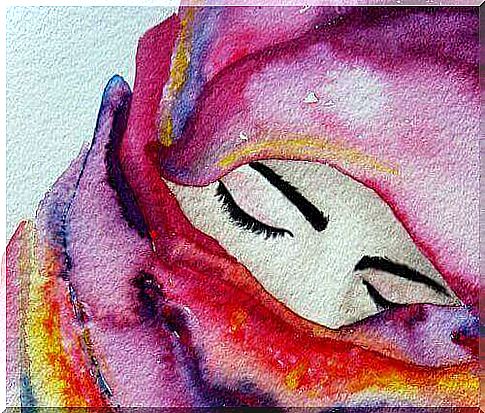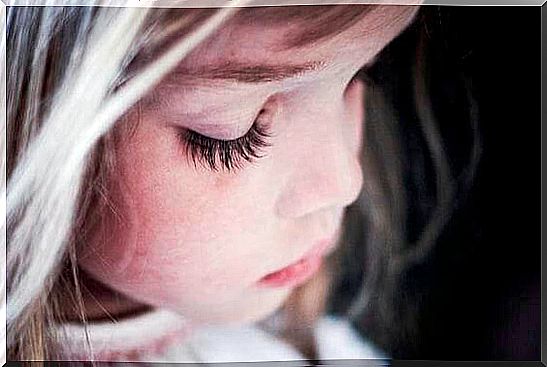The Bigger The Emotional Wound, The More Painful

As much as it hurts you right now, know that this emotional wound you feel inside right now, affecting your whole world, will heal.
The bigger the emotional wound, the more you will suffer and the more lonely you will feel.
Negative emotions are a common enemy in the human mind, affecting us and preventing us from growing. We often see emotional wounds as situations that leave a traumatic mark on your mind throughout your life .
Traumas are an excessive pain that a person has a hard time dealing with and confronting, making it part of your inner landscape. It also influences your behavior and the way you see the world.
We should also point out that wounds are not overcome in the same way they are experienced as a child or adult. Children do not have sufficient resources of their own to process pain, aggression and disappointment.
But children and adults also have something in common. The more intense the trauma or wound, the stronger the sense of isolation. Let’s take a look at this.
You carry the emotional wound inside
Disappointment, betrayal and emotional pain caused by others… It disturbs your inner peace and the perception that until that moment made you feel ‘safe’ and create your well-being.
You could also say that the wounds you carry in silence contain different roots and images. However, psychologists explain that trauma generally has the following characteristics:

Trauma and types of emotional wounds
- If your basic sense of security is disrupted: This can happen during childhood or as an adult. Suddenly you are being cheated by everything and everyone who defined you, who loved you and were your pillars. You lose everything that once gave you security.
- Lack of loving interaction: It is common for children not to receive enough emotional support that strengthens their relationships. This also occurs in partners who do not feel loved or supported by their partners. This is a void that leaves a deep wound.
- Being the victim of certain kinds of abuse: Physical assaults or abuse of self-confidence, violating one’s willpower as a person entitled to one’s own opinion, values and behavior are attacks that are common and generally cause severe trauma.
How traumatic wounds affect us
- The influence of the attack, the lack of emotional support, the breaking of the sense of security that everyone needs, directly affects the brain chemistry.
- Trauma causes a type of post-traumatic stress that keeps the brain constantly alert. Fear, mistrust and anxiety weave themselves among this neurochemical chaos that can lead to depression.
- Noradrenaline, epinephrine or dopamine can lead to insomnia, leaving you always tired and experiencing mood swings.
While each person generally presents a unique set of symptoms and while no case is the same, these changes in neurotransmitters at the cerebral level are somewhat common.

Wounds and feeling lonely
The more intense the emotional wound, the more paralyzed one becomes, which in turn leads to a greater sense of isolation.
- The injured person feels as if no one can understand what he/she is going through, how he/she is suffering.
- The sense of isolation is caused by the alteration of neurotransmitters that intensify the perception of isolation and negativity.
- Emotional turmoil also includes physical discomfort. Fatigue, apathy, muscle aches and headaches also tend to disconnect people from the world.
Also keep in mind that it is not so easy to share your emotional wounds. You can talk about how bad your day was, the conversation you had with your partner… but sharing with the other person how your partner humiliated you or how you were abandoned as a child is something very complex. It is not something that is easily communicated or shared.

How to confront the most serious emotional wounds
It is always interesting to think about issues related to human emotions. Negative emotions can help you understand that something is going wrong and help you rebuild yourself. However, they should never “paralyze” you.
Likewise, positive emotions are meant to “connect” you with those around you. All this means that:
- You have the right to be sad, depressed and angry. These emotions don’t have to be permanent, but they will help you understand that something is wrong and you need to react and fight.
- You are not weak when you ask for help, when you say you are not well, when you run into a roadblock. So don’t hesitate to talk to someone who really listens and can help you.
The past is over
Understand that the past is over. It has already happened, the emotional wound is deep and you will probably never fully heal until it goes away. But you have to understand that:
- Don’t forget the memory, but it allows you to get on with your life without it hurting too much.
- Wounds are healed by covering them with new hopes, new projects that help you free yourself from the past.
- Support yourself with people who really love you. Fight to take care of yourself and to love yourself every day as you deserve.
What someone did to you in the past doesn’t have to define who you are today!









